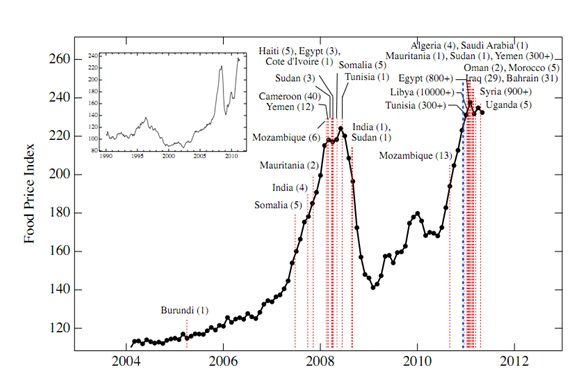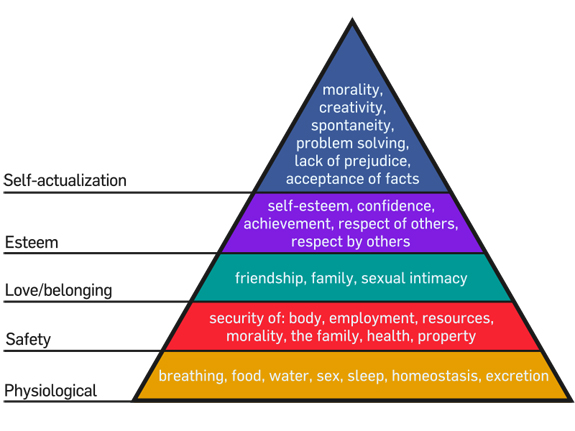Complex Systems Theorists: One Year Away From Global Riots
We Are Now One Year Away From Global Riots, Complex Systems Theorists Say
12 Sep
By Brian Merchant / Motherboard
What’s the number one reason we riot? The plausible, justifiable motivations of trampled-upon humanfolk to fight back are many—poverty, oppression, disenfranchisement, etc—but the big one is more primal than any of the above. It’s hunger, plain and simple. If there’s a single factor that reliably sparks social unrest, it’s food becoming too scarce or too expensive. So argues a group of complex systems theorists in Cambridge, and it makes sense.
In a 2011 paper, researchers at the Complex Systems Institute unveiled a model that accurately explained why the waves of unrest that swept the world in 2008 and 2011 crashed when they did. The number one determinant was soaring food prices. Their model identified a precise threshold for global food prices that, if breached, would lead to worldwide unrest.
The MIT Technology Review explains how CSI’s model works: “The evidence comes from two sources. The first is data gathered by the United Nations that plots the price of food against time, the so-called food price index of the Food and Agriculture Organisation of the UN. The second is the date of riots around the world, whatever their cause.” Plot the data, and it looks like this:

Pretty simple. Black dots are the food prices, red lines are the riots. In other words, whenever the UN’s food price index, which measures the monthly change in the price of a basket of food commodities, climbs above 210, the conditions ripen for social unrest around the world. CSI doesn’t claim that any breach of 210 immediately leads to riots, obviously; just that the probability that riots will erupt grows much greater. For billions of people around the world, food comprises up to 80% of routine expenses (for rich-world people like you and I, it’s like 15%). When prices jump, people can’t afford anything else; or even food itself. And if you can’t eat—or worse, your family can’t eat—you fight.
But how accurate is the model? An anecdote the researchers outline in the report offers us an idea. They write that “on December 13, 2010, we submitted a government report analyzing the repercussions of the global financial crises, and directly identifying the risk of social unrest and political instability due to food prices.” Four days later, Mohamed Bouazizi set himself on fire as an act of protest in Tunisia. And we all know what happened after that.
...
And it’s only going to get worse and worse and worse. Because of climate change-exacerbated disasters like these, “the average price of staple foods such as maize could more than double in the next 20 years compared with 2010 trend prices,” a new report from Oxfam reveals. That report details how the poor will be even more vulnerable to climate change-induced food price shocks than previously thought. After all, we’ve “loaded the climate dice,” as NASA’s James Hansen likes to say, and the chances of such disasters rolling out are greater than ever.
This all goes to say that as long as climate change continues to advance—it seems that nothing can stop that now—and we maintain a global food system perennially subject to volatile price spikes and exploitation from speculators, without reform, our world will be an increasingly restive one. Hunger is coming, and so are the riots.
http://earthfirstnews.wordpress.com/201 ... rists-say/
12 Sep
By Brian Merchant / Motherboard
What’s the number one reason we riot? The plausible, justifiable motivations of trampled-upon humanfolk to fight back are many—poverty, oppression, disenfranchisement, etc—but the big one is more primal than any of the above. It’s hunger, plain and simple. If there’s a single factor that reliably sparks social unrest, it’s food becoming too scarce or too expensive. So argues a group of complex systems theorists in Cambridge, and it makes sense.
In a 2011 paper, researchers at the Complex Systems Institute unveiled a model that accurately explained why the waves of unrest that swept the world in 2008 and 2011 crashed when they did. The number one determinant was soaring food prices. Their model identified a precise threshold for global food prices that, if breached, would lead to worldwide unrest.
The MIT Technology Review explains how CSI’s model works: “The evidence comes from two sources. The first is data gathered by the United Nations that plots the price of food against time, the so-called food price index of the Food and Agriculture Organisation of the UN. The second is the date of riots around the world, whatever their cause.” Plot the data, and it looks like this:

Pretty simple. Black dots are the food prices, red lines are the riots. In other words, whenever the UN’s food price index, which measures the monthly change in the price of a basket of food commodities, climbs above 210, the conditions ripen for social unrest around the world. CSI doesn’t claim that any breach of 210 immediately leads to riots, obviously; just that the probability that riots will erupt grows much greater. For billions of people around the world, food comprises up to 80% of routine expenses (for rich-world people like you and I, it’s like 15%). When prices jump, people can’t afford anything else; or even food itself. And if you can’t eat—or worse, your family can’t eat—you fight.
But how accurate is the model? An anecdote the researchers outline in the report offers us an idea. They write that “on December 13, 2010, we submitted a government report analyzing the repercussions of the global financial crises, and directly identifying the risk of social unrest and political instability due to food prices.” Four days later, Mohamed Bouazizi set himself on fire as an act of protest in Tunisia. And we all know what happened after that.
...
And it’s only going to get worse and worse and worse. Because of climate change-exacerbated disasters like these, “the average price of staple foods such as maize could more than double in the next 20 years compared with 2010 trend prices,” a new report from Oxfam reveals. That report details how the poor will be even more vulnerable to climate change-induced food price shocks than previously thought. After all, we’ve “loaded the climate dice,” as NASA’s James Hansen likes to say, and the chances of such disasters rolling out are greater than ever.
This all goes to say that as long as climate change continues to advance—it seems that nothing can stop that now—and we maintain a global food system perennially subject to volatile price spikes and exploitation from speculators, without reform, our world will be an increasingly restive one. Hunger is coming, and so are the riots.
http://earthfirstnews.wordpress.com/201 ... rists-say/



